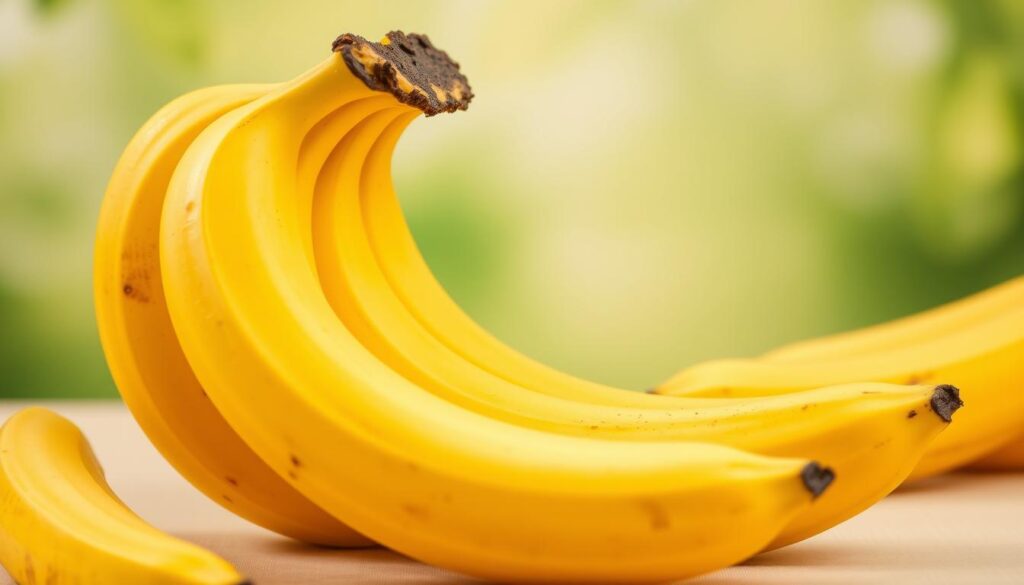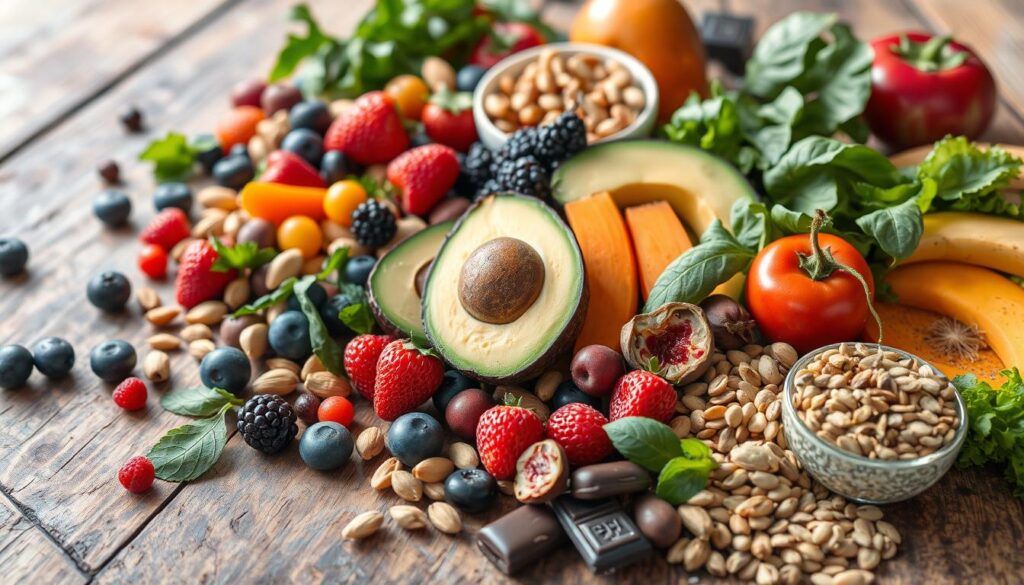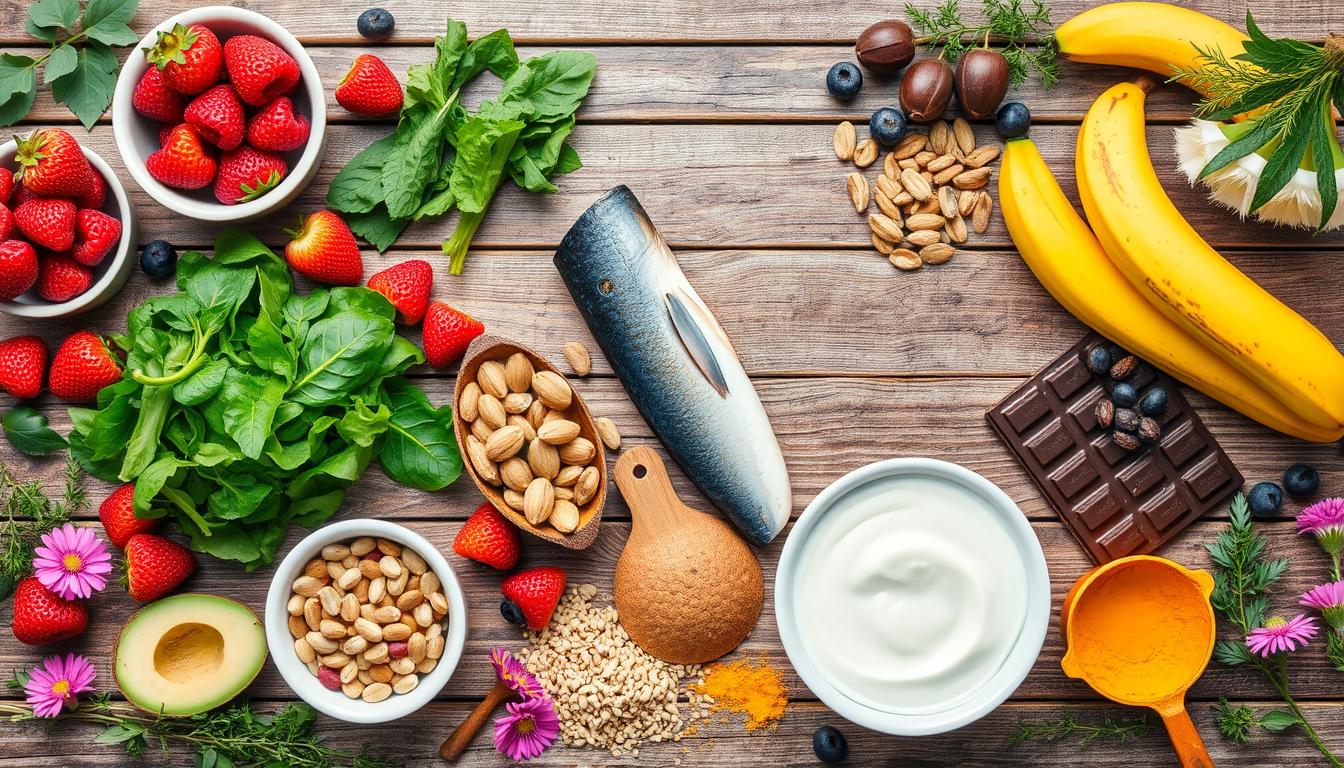Have you ever thought about how food for mental health can significantly improve your mood and energy levels? We all know that the right diet helps our bodies, but it also has a profound impact on our minds.
Choosing 10 foods for mental health can change the way you feel, improve energy, and even reduce stress. So, which foods are essential for boosting your mood and mental energy? Let’s dive into the top 10 foods for mental health and how they can help you feel your best.
Key Takeaways
- Fatty fish rich in omega-3s can significantly boost your mental health and mood.
- Dark chocolate and fermented foods also have mood-boosting effects.
- Choosing seasonal produce can make your diet healthier and more affordable.
- Focusing on nutrient-rich foods helps keep your energy up and mood high.
- Using these 10 foods for mental health can be part of a long-term plan for better health.
Fatty Fish: Omega-3 Powerhouses
When considering foods for mental health, fatty fish such as salmon and tuna are at the top of the list. They are full of omega-3 fatty acids, which are great for your brain. These acids help lower depression levels.
Benefits of Omega-3s
Eating omega-3 fatty acids from fatty fish is good for your mind. They can reduce brain inflammation and improve thinking. They also protect against depression and Alzheimer’s.
Best Fatty Fish to Include
Here are the top fatty fish to eat:
- Salmon
- Tuna
- Mackerel
- Sardines
- Herring
These fish are full of omega-3s and taste great. They’re easy to use in many recipes.
Ways to Cook Fatty Fish
Choosing how to cook your fish is important. It keeps the nutrients and makes the fish taste better. Here are some ways to cook:
- Baking: Baking in the oven is healthy. It keeps the fish moist. Try salmon with olive oil and herbs for a tasty dinner.
- Grilling: Grilling adds a smoky taste. Marinate tuna in soy sauce, garlic, and ginger for a tasty meal.
- Poaching: Poaching is gentle. It keeps the fish tender. Poach mackerel in a lemon and bay leaf broth.
Trying new recipes makes eating fatty fish fun and rewarding.
Dark Chocolate: The Sweet Mood Enhancer
Dark chocolate is loved for its deep flavor. It’s not just a tasty treat but also a mood booster. It has flavonoids and polyphenols that help serotonin levels, which is good for our mood.
Research shows dark chocolate can make us feel better by boosting serotonin in the brain. This hormone helps us feel happy and less depressed. Plus, its flavonoids are antioxidants that keep our brain healthy.
When we eat dark chocolate, picking high cocoa content is key. Choose chocolate with 70% cocoa or more to get the most benefits. This way, we enjoy the sweetness without harming our health.
Dark chocolate, eaten in moderation, is a great mood booster. It’s perfect as a snack, in warm drinks, or in recipes. It’s a delicious way to enjoy life’s small joys!
Fermented Foods: Probiotics for Happiness
Fermented foods like kimchi and yogurt offer probiotics that support gut health and mental clarity, making them excellent foods for mental health. Today, over 5000 types exist worldwide, valued for their gut health benefits. Foods like yogurt, kimchi, and kombucha are full of probiotics. These support gut health and improve mental well-being.

Types of Fermented Foods
Fermented foods come in many forms, from dairy and veggies to legumes and drinks. Here are some favorites:
- Yogurt: It’s full of probiotics that keep the gut healthy, boost neurotransmitters, and improve brain function.
- Kimchi: It’s packed with probiotics that help the brain work better and lower the risk of brain diseases.
- Kombucha: This tea drink has probiotics and antioxidants that balance the gut and boost mental health.
- Miso: A soybean paste with probiotics and nutrients like folate and niacin.
- Tempeh: A fermented soybean product with compounds that help memory.
- Kefir: A fermented drink with lots of probiotics that improve memory.
Gut-Brain Connection
Recent studies show a strong link between gut and brain health. The gut-brain axis lets gut bacteria affect brain functions like mood and memory.
Probiotics from fermented foods boost serotonin, the “happy chemical.” A healthy gut means more serotonin, which makes us feel better and reduces brain inflammation.
Incorporating Fermented Foods in Your Diet
Adding fermented foods to your meals is easy and fun. Here’s how:
- Breakfast Boost: Mix yogurt into your morning smoothie or granola.
- Flavorful Sides: Try kimchi as a spicy side with your meals.
- Refreshing Beverages: Enjoy kombucha as a healthy drink.
- Soup Enhancer: Add miso paste to soups for extra flavor.
- Protein Rich: Use tempeh in stir-fries or salads for probiotic-rich protein.
- Healthy Snacks: Drink kefir as a snack or use it in creamy dressings.
By adding these fermented foods to your diet, you support gut health, boost serotonin, and improve your mental health.
Bananas: Nature’s Fidget Spinner
When you’re looking for foods for mental health, bananas are a powerhouse snack. They are packed with nutrients that boost our mood and mental health. They are rich in vitamin B6, which helps increase serotonin and dopamine. These neurotransmitters are key for feeling good.
Bananas are also full of dietary fiber. This fiber keeps our blood sugar steady, which is vital for our mood. Plus, bananas give us a quick energy boost when we need it most.

Did you know that most of our serotonin is made in our gut? This shows how important our gut health is for our mood. A steady serotonin level helps us feel happy and reduces stress and anxiety.
Bananas are also super versatile. They can be added to many dishes. For a taste of Spain, try making Andalusian gazpacho. It’s a dish that combines great taste with art, showing how food can be a form of expression.
In short, bananas are great for our mental health. They help keep our blood sugar stable and boost serotonin levels. Adding bananas to your diet is a tasty way to improve your mood and overall well-being.
10 Delicious Functional Foods for Mental Health and Well-Being: Boost Mood, Ener
Our understanding of nutritional psychiatry has grown. We now know that food greatly affects our mental health. Foods for well-being help reduce depression and boost mood, making them key in a mental health diet.

How Food Impacts Mental Health
Research shows a strong link between diet and mental health. A study in the American Journal of Clinical Nutrition found that middle-aged women felt better after eating 1.5 grams of omega-3s daily for eight weeks. Foods rich in omega-3s, vitamins B6, folic acid, zinc, and magnesium are vital for brain health and mood.
Examples of Functional Foods
Here are some tasty foods that support mental health:
- Fatty Fish: Sardines and salmon are full of omega-3s, helping reduce inflammation and depression.
- Leafy Greens: Spinach, swiss chard, and watercress are rich in folate, which helps fight depression.
- Nuts and Seeds: Walnuts and chia seeds are great for omega-3s, lowering stress and inflammation.
- Fruits: Blueberries and citrus fruits are full of antioxidants, reducing inflammation and stress.
- Whole Grains: Oats give you energy, keeping your mood steady all day.
- Legumes: Beans and chickpeas are packed with nutrients, supporting gut health and mood.
Combining Foods for Maximum Benefit
Mixing different foods can boost their benefits. For example, adding bananas to oats not only tastes good but also gives you vitamin B6 and serotonin all day. A spinach salad with walnuts and chia seeds is a great mix of omega-3s and folate, making it a complete mental health diet for better mood.
In short, eating a variety of nutrient-rich foods can greatly improve mental health. By using nutritional psychiatry, you can make tasty meals that are good for your mood and emotional well-being.
Oats: The All-Day Energizer
Starting your day with a hearty bowl of oats is not just tasty. It’s also a smart choice for your mental health. Oats are another great option when considering foods for mental health. Unlike simple carbs, oats’ complex carbs release energy slowly, keeping you focused and energetic.
Oats are great for mental health. They have iron, which helps fight mood disorders. Iron supports serotonin, a key mood regulator. Eating oats regularly can boost your mood and mental health.
Oats also help keep blood sugar stable. This is key to avoiding energy crashes that harm our mental health. Adding oats to your breakfast or snack keeps your brain fueled and alert all day.
Oats are a nutritional powerhouse for boosting mental health and energy. Enjoy them as oatmeal, in smoothies, or in granola. Adding oats to your daily routine supports both your mental and physical health.
Berries: The Antioxidant Heroes
Berries are a tasty and healthy way to boost your mental health. They are full of antioxidants, which help with mood and fighting depression. Let’s look at the best berries for your diet, how antioxidants help your mind, and fun ways to add them to your meals.
Top Berries to Eat
First, let’s talk about the top picks:
- Blueberries: Known for their antioxidants, blueberries fight brain stress and inflammation.
- Strawberries: Sweet and full of fiber and vitamin C, strawberries are great for your brain.
- Raspberries: Rich in vitamins and minerals, raspberries boost your brain and mood.
Antioxidants and Their Impact on Mood
Antioxidants are key for mental health. They fight oxidative stress, which is linked to mood issues. By reducing inflammation and protecting brain cells, antioxidants help prevent depression and improve thinking. Eating berries is a tasty way to keep your mind sharp.
Creative Ways to Eat Berries
Adding berries to your diet can be fun! Here are some ideas to get you started:
- Berry Smoothies: Mix your favorite berries with Greek yogurt and almond milk for a yummy smoothie.
- Berry Salads: Berries add flavor and antioxidants to your salads.
- Berry Desserts: Try a berry compote on oatmeal or as a topping for pancakes or waffles.
By adding these antioxidant-rich berries to your meals, you improve your diet and mental health. It’s a step towards preventing depression.
Nuts and Seeds: Small but Mighty
Nuts and seeds are packed with nutrients like fatty acids, proteins, and tryptophan. Tryptophan helps make serotonin, which boosts mood. Adding them to your diet can greatly improve your mental health. Let’s look at tryptophan’s role, the best nuts and seeds for your mind, and some tasty snack ideas!
The Role of Tryptophan
Tryptophan is a key amino acid in many nuts and seeds. It’s crucial for making serotonin, which helps control mood and anxiety. Eating foods rich in tryptophan, like walnuts and sunflower seeds, can lift your mood and reduce depression symptoms.
Best Nuts and Seeds for Mental Health
Some nuts and seeds are better than others for mental health. Here are the top picks:
| Nuts | Key Nutrients | Mental Health Benefits |
|---|---|---|
| Walnuts | Omega-3 fatty acids, antioxidants | Improve cognitive function, memory |
| Almonds | Plant sterols, healthy fats | Reduce cholesterol, support brain health |
| Pistachios | Carotenoids, fiber | Better blood flow, reduce inflammation |
| Cashews | Tryptophan, magnesium | Calming effect, mood enhancement |
| Chia Seeds | Omega-3 fatty acids, fiber | Support brain function, reduce stress |
| Sunflower Seeds | Tryptophan, selenium | Boost mood, reduce anxiety |
Easy Snack Ideas
Adding nuts and seeds to your diet is easy and tasty. Here are some simple snack ideas:
- Trail Mix: Mix your favorite nuts and seeds with dried fruits for a healthy snack.
- Nut Butter: Spread almond or cashew butter on whole-grain toast for a quick snack.
- Yogurt Topping: Sprinkle chia seeds, sunflower seeds, and walnuts on Greek yogurt for extra crunch.
- Energy Balls: Blend dates, almonds, chia seeds, and honey to make energy balls for a quick energy boost.
- Salad Add-Ins: Add toasted seeds or chopped nuts to your salad for more flavor and nutrients.
Conclusion
We’ve looked into how a mood-boosting diet can improve mental health and overall well-being. Fatty fish, rich in omega-3 fatty acids, can help reduce depression and anxiety. Probiotics in foods like Greek yogurt and kimchi also support brain function and happiness.
Adding dark chocolate to your diet can bring more than just sweetness. Its high cocoa content may help with depression thanks to zinc and antioxidants. Bananas, oats, and berries are also great for boosting mood and energy.
Nuts and seeds are small but powerful in boosting serotonin, helping our mental health. Whole grains, dark leafy greens, and turmeric are also key for mental health. They offer a wide range of nutrients that can improve mood and reduce depression risk.
Healthy eating is not just for our bodies but also for our minds. The Mediterranean diet and simple snacks like berries can be medicine. Remember, the food we choose every day can lead to a happier, healthier life.

